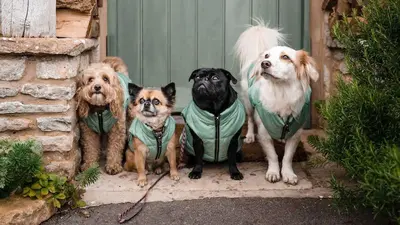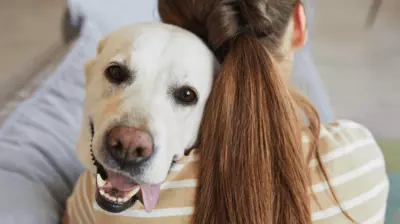A Guide to Taking Your Dog on Holiday
- 23 Jul 2024
- 5m read
.jpg)
Heading on holiday this summer and can’t bear to leave your pooch behind? Don’t worry, we can relate. A staycation is a great way to support local businesses, avoid airport stress and save money. But the best incentive of all? You can easily bring your dog with you.
There’s a bit of prep work involved to help ensure that your holiday is a tail-wagging success. Luckily, we have some tips to help you do just that.
Make sure your dog is protected against disease
Schedule a visit to the vet to confirm that your dog is up-to-date with their vaccinations, including distemper, parvovirus, leptospirosis and infectious hepatitis. Kennel cough and rabies may also be required, depending on your dog’s lifestyle. For example, if they’re going to attend daycare or travel abroad.
You should also make sure that your dog has recently had their flea, tick and worming treatments, these pesky critters can be especially prevalent in new environments. Regular preventative care not only keeps your pup safe, but also prevents the spread of diseases to other animals and people you might meet whilst on your travels.
Safety first
Double-check that your dog’s ID tags are current and attached to their collar and/or harness. Include your phone number and home address. You should also ensure that your pup’s microchip details are up to date, providing extra reassurance should they decide to go on an impromptu solo adventure.
Pack a bag with all of your dog’s essentials
We asked our squad members to make a list of everything that your dog could possibly need for their howl-iday:
Collar and/or harness
Lead
Food
Treats
Medications
Pet first-aid kit
Insurance details
Bed
Blankets
Toys
Collapsible water and food bowls
Portable water bottle
Grooming supplies
Poo bags
Travel crate / carrier
Cooling mat
Towel
Jumper / coat
Shampoo
Dental hygiene supplies
Pet-friendly suncream
As a Butternut Box customer, you can even change your delivery date and address so that it arrives at your holiday address. This takes the stress out of worrying about their food defrosting and overheating in the car. For more advice on this, visit our help centre or contact our Customer Love team.
Take your dog for a long walk before setting off
Before you hit the road, take your pooch for a long walk to help burn off some of their energy. This pre-travel exercise can make a world of difference in keeping your pup calm and relaxed during the journey. A tired dog is more likely to settle down and snooze, making for a smoother and quieter trip.
Plus, it’s a great opportunity for them to relieve themselves and stretch their legs before being confined to a car or train for an extended period.
Make the journey as comfortable as possible
Create a cosy space with a soft bed or blanket that smells like home. This familiar scent can help soothe any travel anxiety. Pack plenty of water and their favourite snacks to keep them hydrated and satisfied. If travelling by car, you should make sure your dog is securely fastened with a seat belt, or in a well-ventilated crate, to keep them safe and steady on the road. Make regular stops for toilet breaks and leg stretches, giving them a chance to sniff around and release some energy.
If your pooch isn't used to travelling, start with short car rides to get them accustomed to the motion.
When travelling by train, bring a comfortable mat or blanket for your pup to sit on. Keep them on a lead and close to you at all times for safety. Have a travel water bowl and snacks on hand, and make sure to take advantage of any stops to let them stretch their legs and use the bathroom.
Stick to your routine
Maintaining a routine for your dog while on holiday is necessary to keep them comfortable and content. Dogs thrive on consistency, so try to stick to their usual feeding, walking, and sleeping schedules as closely as possible.
Consistent routines can also reduce stress and anxiety, making the transition smoother for your dog. Incorporating their usual exercise routine, whether it's a morning walk or playtime, helps keep them physically and mentally stimulated.
Plan dog-friendly activities whilst you’re there
Before you set off, research your destination to find local parks, nature trails, and dog-friendly beaches where your pup can run, play, and explore new surroundings. Look for pet-friendly cafes and pubs where you can relax and enjoy a meal or a coffee together, they often provide water bowls and sometimes even special treats for dogs. Spending time in these settings not only gives you a chance to unwind but also helps your dog get used to different environments and social situations.
If you're staying in a city or town, check out local events or markets that welcome dogs. Farmers’ markets, outdoor concerts, and street fairs can be fun for your dog to explore, providing plenty of stimulation and opportunities for socialisation.
For a more relaxed pace, consider planning a picnic in a dog-friendly park. Pack a blanket, some snacks, and your dog’s favourite toys. This can be a wonderful way to spend a leisurely afternoon, giving your dog the chance to enjoy your company and the great outdoors in a low-key setting.
If you’re near water, look for dog-friendly lakes, rivers, or beaches where your dog can splash around and cool off. Swimming is not only great exercise but also a fun way for your dog to beat the heat and enjoy a new activity. Always check local regulations to ensure dogs are allowed, and bring along fresh water and towels for drying off.
Be patient and understanding with your dog
When you’re away from home, it’s important to be extra patient and understanding with your dog as they adjust to their new surroundings. Being in an unfamiliar environment can be stressful for your pooch, so give them time to acclimate to the new sights, sounds, and smells.
Maintain a calm demeanour and offer reassurance through cuddles, gentle words, familiar routines and comforting items from home, such as their favourite blanket or toy.




